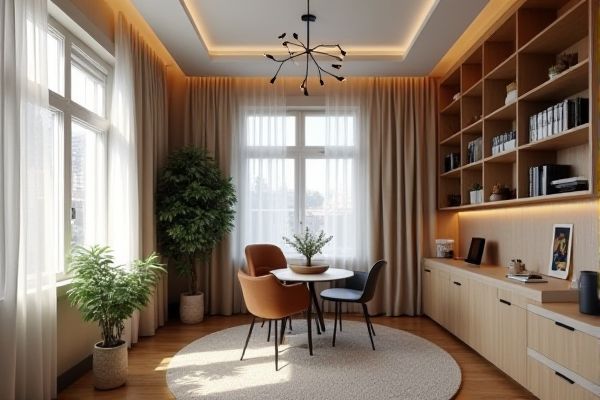
Study nooks offer a compact, cozy space ideal for quick, focused sessions, while study rooms provide a larger, quieter environment perfect for extended learning and group work. Discover which option best suits Your study habits and lifestyle by reading the full article.
Table of Comparison
| Feature | Study Nook | Study Room |
|---|---|---|
| Size | Compact, small space | Spacious, dedicated room |
| Privacy | Limited, semi-private | High, fully private |
| Noise Control | Moderate, depends on location | Better, insulated environment |
| Cost | Low, minimal setup | Higher, requires furnishing |
| Furniture | Basic, often built-in desk | Complete setup: desk, chair, storage |
| Usage | Quick study sessions | Extended study and work hours |
| Flexibility | Limited due to space | Flexible layout and functions |
Introduction to Study Nooks and Study Rooms
Study nooks offer compact, personalized spaces ideal for focused learning in small areas, while study rooms provide larger, versatile environments suitable for group work and extended study sessions. Both options enhance productivity but differ in scale, privacy, and usability based on your needs. Selecting between a study nook or study room depends on available space, study habits, and the desired level of interaction or solitude.
Defining Study Nooks: Features and Advantages
Study nooks are compact, dedicated spaces designed for focused learning, often featuring built-in desks, shelves, and minimal distractions. Their small size maximizes efficient use of space, making them ideal for homes with limited rooms while providing a personalized area that enhances concentration. You can benefit from a study nook's cozy environment that promotes productivity without the need for an entire study room.
What Makes a Study Room Unique?
A study room is unique due to its dedicated space designed exclusively for focused academic work, offering privacy and minimal distractions compared to study nooks. It typically includes ergonomic furniture, ample lighting, and storage tailored for books and study materials, enhancing productivity and comfort. Unlike study nooks, study rooms provide an environment conducive to extended study sessions and collaborative learning, making them ideal for students and professionals seeking concentration and organization.
Space Optimization: Nooks vs. Full Rooms
Study nooks maximize limited space by utilizing corners, alcoves, or underutilized areas, making them ideal for small apartments or homes with tight layouts. Study rooms offer more spatial freedom, allowing for larger desks, additional storage, and a more organized study environment, at the cost of dedicating an entire room. Space optimization is key in choosing between the compact efficiency of nooks and the expansive functionality of full study rooms.
Cost Comparison: Budgeting for Your Study Area
Study nooks typically offer a more cost-effective solution compared to full study rooms, requiring less space and minimal furnishing expenses, making them ideal for budget-conscious individuals. Study rooms often involve higher costs due to the need for larger areas, comprehensive furniture, and additional lighting or ventilation considerations. Allocating funds efficiently by choosing a study nook can maximize productivity without the significant investment that study rooms demand.
Privacy and Focus: Which Option Wins?
Study nooks provide enhanced privacy by offering a small, secluded space that minimizes distractions and supports intense focus, ideal for individual tasks. Study rooms, while larger and potentially shared, may introduce interruptions but also accommodate group collaboration and resource access. For pure privacy and concentration, study nooks generally outperform study rooms in minimizing external noise and visual disturbances.
Design Flexibility and Personalization
Study nooks offer design flexibility by fitting into small or irregular spaces, allowing for customized layouts that cater to individual preferences and needs. Study rooms provide more expansive areas, enabling extensive personalization through varied furniture choices, storage solutions, and decor to create an immersive work environment. Both spaces enhance productivity by integrating ergonomic designs and tailored elements according to user requirements.
Impact on Productivity and Learning Outcomes
Study nooks offer a focused, cozy environment that minimizes distractions, enhancing your concentration and boosting productivity for short, intensive study sessions. Study rooms provide spacious settings that support longer study periods, group work, and diverse learning activities, often leading to improved collaboration and comprehensive understanding. Both options influence learning outcomes differently depending on the task complexity and individual study preferences.
Ideal User Profiles: Who Benefits from Each?
Study nooks benefit individuals seeking a quiet, personalized space for focused tasks like reading or quick reviews, ideal for students or professionals with limited space who need minimal distractions. Study rooms cater to those requiring more extensive setups, such as multiple monitors or collaborative study sessions, perfect for groups, researchers, or users managing complex projects. Your choice depends on whether you prioritize compact, intimate focus zones or spacious, versatile environments for various study needs.
Conclusion: Choosing the Right Study Space for You
Selecting the right study space depends on your personal preferences and learning style. Study nooks offer a cozy, distraction-free environment ideal for short, focused sessions, while study rooms provide more space and resources suited for extended study or group work. Assess your habits and space availability to create an effective study environment that boosts your productivity.
 homyna.com
homyna.com